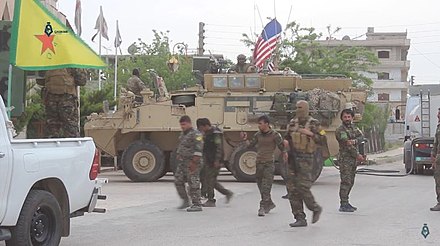BEIRUT — President Trump’s hopes for a swift withdrawal of U.S. troops from Syria may prove premature, because the Islamic State is showing signs of renewed strength in its last strongholds in the east of the country, Syrian Kurdish officials said Thursday.
A complete defeat of the militants could yet be many years away, the officials said, expressing relief that Trump appears to have backtracked on comments made earlier this week that he wanted to pull U.S. troops out right away.
The Kurds said they have received assurances from the U.S. military that the estimated 2,000 or so U.S. troops in northern Syria won’t leave imminently, and a White House statement on Wednesday indicated that they will remain until the Islamic State is defeated.
That could take time, the officials say, because the Islamic State has been putting up stiff resistance in the last two pockets of territory it controls along the Syria-Iraq border. No progress has been made in months, and the militants are starting to reclaim some of the territory they had lost.
Defeating the group, also known in Arabic as Daesh, “will take a long time, maybe years and years,” said Saleh Muslim, the leader of the Democratic Union Party (PYD), a Kurdish political party in control of the northeastern area of Syria where the U.S. troops are deployed. “These are desert areas and Daesh can move between Iraq and Syria. They are not going to be finished so easily.”
Offensive operations by the Kurdish-led Syrian Democratic Forces (SDF), the U.S. ally in Syria, were slowed by the Turkish invasion of the Kurdish enclave of Afrin in northern Syria in February, which prompted Kurdish and Arab fighters to leave the front line against the Islamic State to help defend the enclave. In recent days, Islamic State fighters have taken back an oil field and a village in the Deir al-Zour area, their first advances since they were routed from most of their major strongholds in Syria and Iraq last year.
“ISIS took advantage of the Afrin operation to catch its breath and organize its ranks and now has started to launch a counteroperation against our forces and civilians,” said Nasser Haj Mansour, a former senior commander with Kurdish forces in Syria who is now an analyst at the Furat Studies Center. He said the Kurds are confident U.S. troops will stay to see the battle through.
“The American officials here say all of this is just a misunderstanding and that they have told the administration that you cannot just leave Syria now,” he said. “Any American quick and sudden withdrawal of forces will generate a huge power vacuum in Syria.”
“It would be a disaster, and even ordinary people in the street will consider it a betrayal,” said Bedran Ciya Kurd, an official with the self-proclaimed administration running northeastern Syria, who estimates U.S. troops need to stay an additional three years in Syria to ensure the complete defeat of the Islamic State.
But the White House commitment to remain in Syria until the Islamic State is defeated may give the Kurds only a temporary reprieve. U.S. officials have said they believe it will take months, not years, to defeat the remnants of the Islamic State, and the military effort remains subject to Trump’s whims.
An abrupt withdrawal would leave Syria’s Kurds highly vulnerable not only to a revival of the Islamic State but also to the predations of their many foes, including Turkey to the north, and to the Syrian government alongside its Iranian and Russian allies to the west and south. Those nations have watched with alarm as the Kurds, aided by the U.S. military, assumed control of a vast area of northeastern Syria as they rolled back the Islamic State, expanding their autonomous Kurdish administration in the process.
A conflict threatening to erupt between Turkey and the Kurdish-led SDF in the town of Manbij is further distracting attention from the Islamic State fight. Even as Trump was promising an imminent withdrawal from Syria, U.S. troop reinforcements were being dispatched to the town, where the U.S.-backed SDF is facing down Turkish-backed Syrian rebels along a tense front line. Videos posted by local journalists have shown convoys of equipment arriving in the area and U.S. troops overseeing the establishment of at least two new bases.
As if to demonstrate their solidarity with the SDF, U.S. troops showed up in Manbij on Thursday during a demonstration organized to protest Turkey’s incursion into northern Syria, according to photographs distributed by the SDF’s press office. The troops mingled with the crowd and chatted with local security officials, but it was unclear whether they were aware they were attending a protest directed against America’s NATO ally Turkey.
A U.S. military spokesman, Maj. Adrian Rankine-Galloway, declined to comment either on the troop reinforcements or the visit by U.S. troops to the center of Manbij. “Commanders are delegated the authority and the responsibility to position the number of people and resources needed to accomplish the mission and to protect themselves,” he said in an emailed statement.
Muslim said that a withdrawal of U.S. troops within months would run counter to U.S. interests as well as Kurdish ones.
“After fighting for four years, there is a kind of trust between the Kurdish nation and the American nation,” he said. “If the Americans abandon the Kurds, it means they are never going to find any friends in the Middle East.”
Zakaria reported from Istanbul.

